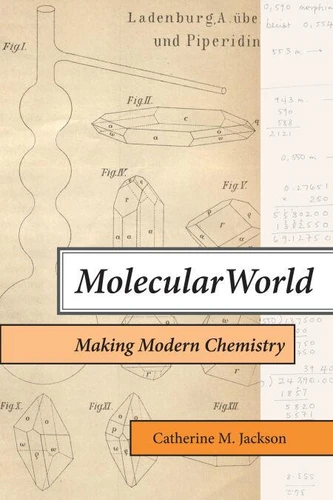Molecular World. Making Modern Chemistry
Par :Formats :
Disponible dans votre compte client Decitre ou Furet du Nord dès validation de votre commande. Le format ePub protégé est :
- Compatible avec une lecture sur My Vivlio (smartphone, tablette, ordinateur)
- Compatible avec une lecture sur liseuses Vivlio
- Pour les liseuses autres que Vivlio, vous devez utiliser le logiciel Adobe Digital Edition. Non compatible avec la lecture sur les liseuses Kindle, Remarkable et Sony
- Non compatible avec un achat hors France métropolitaine
 , qui est-ce ?
, qui est-ce ?Notre partenaire de plateforme de lecture numérique où vous retrouverez l'ensemble de vos ebooks gratuitement
Pour en savoir plus sur nos ebooks, consultez notre aide en ligne ici
- Nombre de pages460
- FormatePub
- ISBN978-0-262-37448-4
- EAN9780262374484
- Date de parution04/07/2023
- Protection num.Adobe DRM
- Taille36 Mo
- Infos supplémentairesepub
- ÉditeurThe MIT Press
Résumé
A compelling and innovative account that reshapes our view of nineteenth-century chemistry, explaining a critical period in chemistry's quest to understand and manipulate organic nature. According to existing histories, theory drove chemistry's remarkable nineteenth-century development. In Molecular World, Catherine M. Jackson shows instead how novel experimental approaches combined with what she calls "laboratory reasoning" enabled chemists to bridge wet chemistry and abstract concepts and, in so doing, create the molecular world.
Jackson introduces a series of practice-based breakthroughs that include chemistry's move into lampworked glassware, the field's turn to synthesis and subsequent struggles to characterize and differentiate the products of synthesis, and the gradual development of institutional chemical laboratories, an advance accelerated by synthesis and the dangers it introduced. Jackson's historical reassessment emerges from the investigation of alkaloids by German chemists Justus Liebig, August Wilhelm Hofmann, and Albert Ladenburg.
Stymied in his own research, Liebig steered his student Hofmann into pioneering synthesis as a new investigative method. Hofmann's practice-based laboratory reasoning produced a major theoretical advance, but he failed to make alkaloids. That landmark fell to Ladenburg, who turned to cutting-edge theory only after his successful synthesis. In telling the story of these scientists and their peers, Jackson reveals organic synthesis as the ground chemists stood upon to forge a new relationship between experiment and theory-with far-reaching consequences for chemistry as a discipline.
Jackson introduces a series of practice-based breakthroughs that include chemistry's move into lampworked glassware, the field's turn to synthesis and subsequent struggles to characterize and differentiate the products of synthesis, and the gradual development of institutional chemical laboratories, an advance accelerated by synthesis and the dangers it introduced. Jackson's historical reassessment emerges from the investigation of alkaloids by German chemists Justus Liebig, August Wilhelm Hofmann, and Albert Ladenburg.
Stymied in his own research, Liebig steered his student Hofmann into pioneering synthesis as a new investigative method. Hofmann's practice-based laboratory reasoning produced a major theoretical advance, but he failed to make alkaloids. That landmark fell to Ladenburg, who turned to cutting-edge theory only after his successful synthesis. In telling the story of these scientists and their peers, Jackson reveals organic synthesis as the ground chemists stood upon to forge a new relationship between experiment and theory-with far-reaching consequences for chemistry as a discipline.
A compelling and innovative account that reshapes our view of nineteenth-century chemistry, explaining a critical period in chemistry's quest to understand and manipulate organic nature. According to existing histories, theory drove chemistry's remarkable nineteenth-century development. In Molecular World, Catherine M. Jackson shows instead how novel experimental approaches combined with what she calls "laboratory reasoning" enabled chemists to bridge wet chemistry and abstract concepts and, in so doing, create the molecular world.
Jackson introduces a series of practice-based breakthroughs that include chemistry's move into lampworked glassware, the field's turn to synthesis and subsequent struggles to characterize and differentiate the products of synthesis, and the gradual development of institutional chemical laboratories, an advance accelerated by synthesis and the dangers it introduced. Jackson's historical reassessment emerges from the investigation of alkaloids by German chemists Justus Liebig, August Wilhelm Hofmann, and Albert Ladenburg.
Stymied in his own research, Liebig steered his student Hofmann into pioneering synthesis as a new investigative method. Hofmann's practice-based laboratory reasoning produced a major theoretical advance, but he failed to make alkaloids. That landmark fell to Ladenburg, who turned to cutting-edge theory only after his successful synthesis. In telling the story of these scientists and their peers, Jackson reveals organic synthesis as the ground chemists stood upon to forge a new relationship between experiment and theory-with far-reaching consequences for chemistry as a discipline.
Jackson introduces a series of practice-based breakthroughs that include chemistry's move into lampworked glassware, the field's turn to synthesis and subsequent struggles to characterize and differentiate the products of synthesis, and the gradual development of institutional chemical laboratories, an advance accelerated by synthesis and the dangers it introduced. Jackson's historical reassessment emerges from the investigation of alkaloids by German chemists Justus Liebig, August Wilhelm Hofmann, and Albert Ladenburg.
Stymied in his own research, Liebig steered his student Hofmann into pioneering synthesis as a new investigative method. Hofmann's practice-based laboratory reasoning produced a major theoretical advance, but he failed to make alkaloids. That landmark fell to Ladenburg, who turned to cutting-edge theory only after his successful synthesis. In telling the story of these scientists and their peers, Jackson reveals organic synthesis as the ground chemists stood upon to forge a new relationship between experiment and theory-with far-reaching consequences for chemistry as a discipline.



